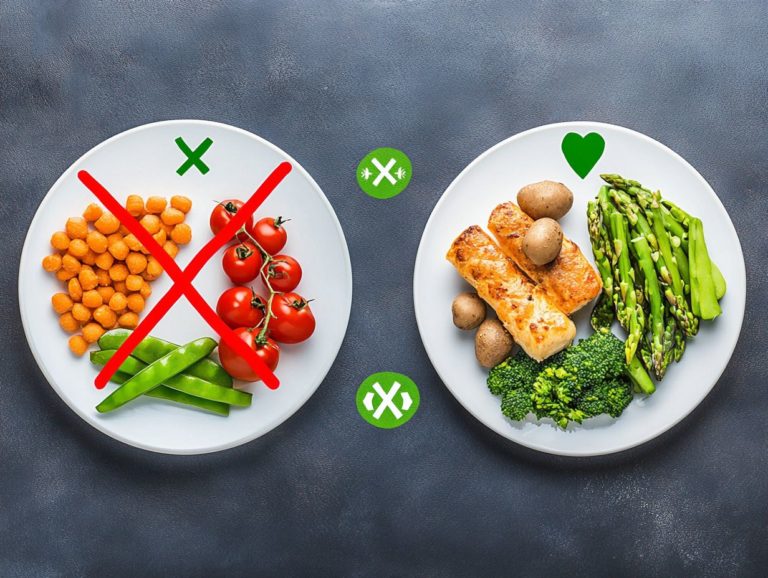The Truth About Meal Timing and Weight Loss
Discover how meal timing can transform your health journey! It frequently gets underestimated in weight loss conversations, yet it significantly influences how your body processes food and manages energy.
This article delves into the intricate relationship between meal timing and metabolism. You ll learn how proper scheduling can optimize digestion, stabilize blood sugar levels, and bolster your weight loss efforts.
You ll discover common myths surrounding meal timing and receive practical tips designed for a variety of goals. Embark on this exploration with us as we reveal the truth about meal timing and its profound impact on your wellness journey.
Contents
- Key Takeaways:
- Understanding Meal Timing and Weight Loss
- Benefits of Proper Meal Timing
- The Impact of Meal Timing on Weight Loss
- Tips for Optimal Meal Timing
- Common Myths About Meal Timing and Weight Loss
- Debunking Misconceptions
- Frequently Asked Questions
- What is the truth about meal timing and weight loss?
- Can eating at a certain time of day affect weight loss?
- Is it better to eat small, frequent meals for weight loss?
- Do I need to eat breakfast for weight loss?
- Is it true that eating after a certain time will result in weight gain?
- Can meal timing affect metabolism?
Key Takeaways:
Proper meal timing can regulate metabolism, leading to improved digestion and nutrient absorption.
- Consistent meal timing can help regulate blood sugar levels, potentially aiding in weight loss efforts.
- Meal timing may impact weight loss, but it is not the only factor focus on overall healthy eating habits for best results.
Understanding Meal Timing and Weight Loss
Understanding the relationship between meal timing and weight loss is essential for your health and nutrition journey. It can significantly influence factors like caloric intake, body mass index, and even your risk of chronic conditions such as heart disease.
Recent research has shed light on the benefits of meal timing strategies, particularly practices like intermittent fasting and time-restricted eating. Experts, including those from the American Heart Association, have endorsed these methods.
Nutrition researchers increasingly acknowledge that meal timing plays a pivotal role in achieving effective weight loss and enhancing overall health outcomes.
The Relationship Between Meal Timing and Metabolism
The relationship between meal timing and metabolism is crucial in nutritional science. Research shows that how often you eat can significantly influence your energy intake and overall body weight, ultimately affecting your metabolic rate.
For instance, studies show that when you distribute your caloric intake across several smaller meals throughout the day, you may enjoy a more stable metabolic rate compared to those who indulge in larger, less frequent meals.
This consistency aids in regulating insulin levels and maintaining that all-important feeling of fullness, which can be beneficial for weight management. Evidence also suggests that timed eating patterns like aligning your meals with your circadian rhythms not only boost energy expenditure but also enhance your metabolic flexibility.
As you navigate your eating schedule, grasping these dynamics becomes vital for achieving and maintaining a healthy weight.
Benefits of Proper Meal Timing
Proper meal timing presents a wealth of benefits, from improved digestion and enhanced nutrient absorption to regulated blood sugar levels. Each of these elements plays a crucial role in living healthier and achieving effective weight management.
Improved Digestion and Nutrient Absorption

Adhering to a structured meal timing regimen offers key advantages, notably improved digestion and nutrient absorption. This approach enables your body to effectively utilize healthful foods, paving the way for optimal health.
Research indicates that meal size plays a crucial role in these processes. For instance, larger meals can lead to slower digestion and may overwhelm your system, while smaller, more frequent meals promote better metabolic function and nutrient uptake.
A study published in the Journal of Nutritional Science revealed that participants consuming medium-sized meals experienced enhanced nutrient absorption compared to those who opted for fewer, larger meals.
Eating earlier in the day maximizes digestion efficiency and enhances your body s ability to utilize nutrients, ultimately contributing to improved overall well-being.
Regulated Blood Sugar Levels
Regulated blood sugar levels are vital for your overall health, especially if you are at risk for Type 2 diabetes. You might be surprised to learn that meal timing plays a significant role in achieving this balance.
Research shows you can stabilize your insulin sensitivity by sticking to consistent meal times, which is essential for avoiding pesky spikes and drops in blood sugar. A study published in the journal Diabetes Care revealed that individuals with regular eating patterns experienced lower blood sugar levels after eating compared to those with erratic meal schedules.
By prioritizing meal timing, you can enhance your metabolic responses, reducing the chances of weight gain a major risk factor for Type 2 diabetes. Understanding this relationship enables you to make informed dietary choices and highlights the importance of lifestyle modifications in maintaining optimal health.
The Impact of Meal Timing on Weight Loss
The influence of meal timing on weight loss has been thoroughly researched. Strategies like intermittent fasting and time-restricted eating can yield impressive results.
By reducing caloric intake and aiding in effective body weight management, these practices offer a compelling approach to achieving your health goals.
How Meal Timing Affects Weight Loss
Meal timing plays a crucial role in weight loss. It impacts both your caloric intake and metabolic processes, leading to significant changes in body weight over time.
By thoughtfully scheduling your meals, you may find it easier to manage your caloric consumption and achieve a healthier weight. For instance, opting for smaller, more frequent meals throughout the day can help stabilize your blood sugar levels, preventing impulsive snacking when extreme hunger strikes.
Irregular eating patterns can increase cravings and diminish your metabolic efficiency, making weight management more challenging. Poor meal timing, such as indulging in late-night snacks, can disrupt sleep patterns and throw your hormonal balance off-kilter, raising the chances of weight gain and related health issues.
Tips for Optimal Meal Timing

By implementing effective strategies for optimal meal timing, you can supercharge your weight loss efforts and elevate your overall health.
This involves thoughtfully selecting nutritious foods and being mindful of your meal frequency.
Meal Timing Strategies for Different Goals
Meal timing strategies can be tailored to align with your specific health goals, whether you aim for weight loss, improved digestion, or an enhanced intake of nourishing foods.
By grasping how the timing and portion sizes of your meals influence metabolism and energy levels, you can make informed choices that support your personal wellness objectives.
If you are focused on shedding pounds, opting for smaller, more frequent meals can help manage hunger and prevent overeating. If muscle gain is your goal, larger meals spaced strategically around your workouts can optimize nutrient absorption and recovery.
Adjusting when you eat can significantly enhance your digestion. Practices like intermittent fasting, which means limiting eating to a certain time frame each day, can give your digestive system a much-needed break, allowing it to function more efficiently.
Ultimately, the secret lies in personalizing these strategies to fit your lifestyle and health aspirations.
Common Myths About Meal Timing and Weight Loss
Dispelling common myths surrounding meal timing and weight loss is crucial for gaining a clearer perspective on the importance of meal timing and how practices like intermittent fasting can genuinely affect health outcomes and body composition.
By understanding these nuances, you enable yourself to make informed choices that align with your wellness goals.
Have you ever wondered how meal timing could change your weight loss journey? Start implementing meal timing strategies today for better health!
Debunking Misconceptions
Understanding meal timing is crucial for adopting effective weight loss strategies and recognizing the real health risks of improper meal timing. For a deeper insight, explore the truth about weight loss myths.
Many believe that skipping meals, especially breakfast, leads to greater weight loss. You might be surprised to learn that skipping meals can backfire, slowing your metabolism and encouraging overeating later in the day.
The idea that eating late at night significantly contributes to weight gain is often exaggerated. Studies reveal that total caloric intake and the quality of food you consume are far more important than the time on the clock.
By uncovering these myths now, you can take charge of your health today, paving the way for sustainable and healthy eating practices.
Frequently Asked Questions

What is the truth about meal timing and weight loss?
Meal timing isn t the game-changer you think it is! What matters most is the overall quality and quantity of the food you consume.
Can eating at a certain time of day affect weight loss?
No, there’s no scientific evidence that eating at a specific time will result in weight loss. What matters more is the balance of macronutrients and overall calorie intake.
Is it better to eat small, frequent meals for weight loss?
There s no one-size-fits-all approach to weight loss. Some may find success with smaller, more frequent meals, while others prefer larger, less frequent meals. It ultimately depends on personal choices.
Do I need to eat breakfast for weight loss?
No, there’s no scientific evidence to suggest that skipping breakfast hinders weight loss. What matters most is the overall balance of calories and nutrients throughout the day.
Is it true that eating after a certain time will result in weight gain?
There s no evidence that eating after a certain time leads to weight gain. What matters is the overall quality and quantity of the food you consume, not the time of day.
Can meal timing affect metabolism?
While some studies suggest meal timing may have a small impact on metabolism, the overall effect is minimal and not significant enough to affect weight loss. What matters most is consistent and balanced nutrition.

 Proper meal timing can regulate metabolism, leading to improved digestion and nutrient absorption.
Proper meal timing can regulate metabolism, leading to improved digestion and nutrient absorption.




